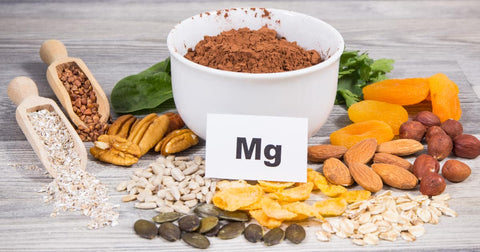Estrogen, often called the "female hormone," plays a pivotal role in a woman's health and well-being. It influences everything from reproductive health and bone density to skin elasticity and mood regulation. When estrogen levels dip too low, various symptoms can arise, impacting both physical and emotional health.

If you're a woman, seeking ways to support your estrogen levels naturally, you're in the right place. Let's explore the key vitamins that can help increase estrogen levels, promote hormonal balance, and empower you to embrace your vitality.
Vitamins to Increase Estrogen Levels: Nature's Boosters
Several essential vitamins play a crucial role in estrogen production and metabolism. Incorporating these into your diet or considering supplementation can be a natural approach to maintaining hormonal balance.
- Vitamin D: Often referred to as the "sunshine vitamin," vitamin D functions like a hormone in the body and is crucial for estrogen production. Studies have shown a link between vitamin D deficiency and low estrogen levels. Sunlight exposure, fatty fish, and fortified foods are good sources of vitamin D.
- B Vitamins: B vitamins, particularly B6 and B12, are essential cofactors in hormone production and metabolism. They help the body utilize estrogen effectively. You can find B vitamins in various foods like meat, poultry, fish, eggs, and leafy greens.
- Vitamin C: This powerful antioxidant protects your ovaries from free radical damage and supports healthy estrogen levels. Citrus fruits, berries, and bell peppers are excellent sources of vitamin C.
-
Vitamin E: While research is ongoing, some studies suggest that Vitamin E might have a positive impact on estrogen levels and help manage menopausal symptoms. Nuts, seeds, and spinach are good sources of Vitamin E.
Vitamins to Balance Hormones for Females: Beyond Estrogen

Hormonal balance involves more than just estrogen. Other key players include progesterone, testosterone, and thyroid hormones. Several vitamins support overall hormonal health:
-
Magnesium: This mineral is involved in over 300 biochemical reactions in the body, including hormone production and regulation. Magnesium-rich foods include leafy greens, nuts, seeds, and whole grains.
-
Zinc: Zinc is essential for various hormonal processes, including the production of testosterone and progesterone. It also plays a role in thyroid hormone function. Meat, shellfish, nuts, and legumes are good sources of zinc.
Hormone Balance Supplements: Navigating the Options
If dietary intake alone isn't sufficient, you might consider hormone balance supplements. These supplements typically contain a blend of vitamins, minerals, and herbs that support healthy hormone levels.
However, it's important to consult with a healthcare professional before taking any supplements, especially if you have any existing medical conditions or are taking medication.
Best Female Hormone Balance Supplements: Making an Informed Choice
The "best" supplement for you depends on your individual needs and health goals. Look for supplements that contain:
- Clinically studied ingredients: Choose supplements backed by research on their effectiveness in supporting hormonal balance.
- Transparent labeling: The supplement should clearly list all ingredients and their dosages.
- Reputable brands: Opt for brands known for their quality and commitment to safety.
- Consultation with a healthcare professional: Discuss any supplements with your doctor or a registered dietitian to ensure they're appropriate for you.
How to Regulate Hormones: Lifestyle Plays a Role

While vitamins and supplements can support hormonal balance, lifestyle factors also play a critical role:
- Manage Stress: Chronic stress can disrupt hormone production. Incorporate stress-management techniques like yoga, meditation, or spending time in nature into your routine.
- Get Adequate Sleep: Quality sleep is vital for hormone regulation. Aim for 7-8 hours of uninterrupted sleep each night.
- Maintain a Healthy Weight: Excess body fat can disrupt hormone balance. Strive for a healthy weight through a balanced diet and regular exercise.
- Avoid Endocrine Disruptors: Limit exposure to chemicals like BPA, phthalates, and pesticides that can interfere with hormone function.
Food Intolerance: A Potential Hormonal Disruptor
Unexplained hormonal imbalances and persistent digestive issues can sometimes be linked to food intolerances or sensitivities. These can trigger inflammation and disrupt the delicate balance of your gut microbiome, potentially impacting hormone production and metabolism.
A food sensitivity test can help identify specific trigger foods, allowing you to make dietary adjustments that support hormonal health and overall well-being.
Key Takeaways:
- Several vitamins like Vitamin D, B Vitamins, Vitamin C, and Vitamin E can support healthy estrogen levels in women.
- Maintaining hormonal balance involves considering other hormones like progesterone, testosterone, and thyroid hormones, supported by essential vitamins and minerals.
- Lifestyle factors like stress management, adequate sleep, and maintaining a healthy weight contribute to optimal hormone function.

- If you experience persistent hormonal imbalances or digestive issues, consider a food sensitivity test to identify potential food triggers.
Disclaimer: This article is for informational purposes only and should not be considered a substitute for professional medical advice. Always consult with your healthcare provider before starting any new supplements or making significant dietary changes.
Frequently Asked Questions:
1. Are there any side effects associated with taking these vitamins or supplements for hormonal balance?
While generally safe when taken in recommended dosages, some individuals might experience mild side effects like digestive upset or headaches. It's crucial to consult your doctor before starting any new supplements, especially if you have existing health conditions or are taking medications.
2. Can I get all these vitamins through my diet alone?
A balanced and nutrient-rich diet can provide a significant portion of the vitamins needed for hormonal balance. However, depending on your individual needs and dietary habits, supplementation might be necessary. Consulting a registered dietitian or healthcare provider can help assess your specific needs.
3. How long does it take to see results from taking vitamins for hormone balance?
It varies depending on the individual, the severity of hormonal imbalance, and the specific vitamins or supplements used. Generally, it might take several weeks or even months to notice significant improvements. Be patient and consistent with your routine.
4. Are there any natural alternatives to supplements for boosting estrogen levels?
Yes, some foods contain phytoestrogens, plant compounds that mimic estrogen in the body. These include soy products, flaxseeds, sesame seeds, and certain fruits and vegetables. However, their effectiveness varies, and it's essential to consult your doctor before relying solely on dietary sources.
5. I'm experiencing symptoms of hormonal imbalance. How can I find a qualified healthcare provider in Miami to help me?
You can search online for "hormone specialist near me" or "OBGYN in Miami" to find qualified healthcare professionals in your area. You can also ask for recommendations from friends, family, or your primary care physician.


.png?v=1737390083)
.png?v=1737187409)


